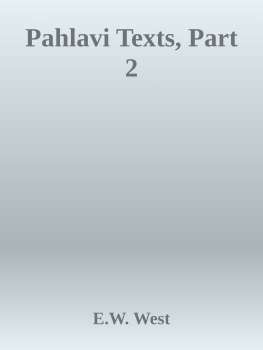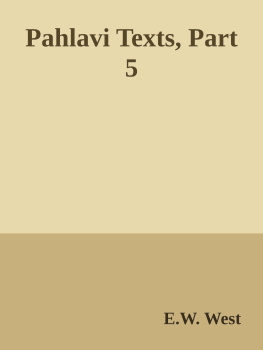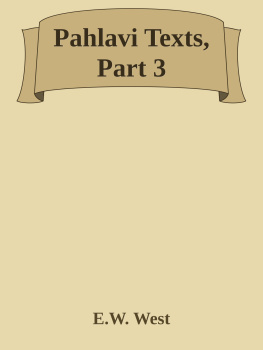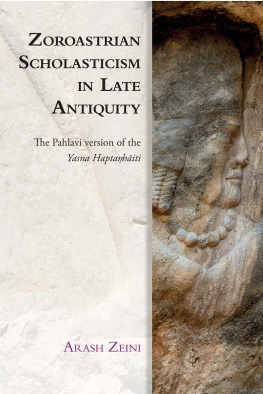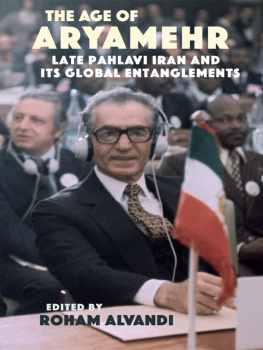E.W. West (tr.) - Pahlavi Texts, Part 2
Here you can read online E.W. West (tr.) - Pahlavi Texts, Part 2 full text of the book (entire story) in english for free. Download pdf and epub, get meaning, cover and reviews about this ebook. genre: Religion. Description of the work, (preface) as well as reviews are available. Best literature library LitArk.com created for fans of good reading and offers a wide selection of genres:
Romance novel
Science fiction
Adventure
Detective
Science
History
Home and family
Prose
Art
Politics
Computer
Non-fiction
Religion
Business
Children
Humor
Choose a favorite category and find really read worthwhile books. Enjoy immersion in the world of imagination, feel the emotions of the characters or learn something new for yourself, make an fascinating discovery.
- Book:Pahlavi Texts, Part 2
- Author:
- Genre:
- Rating:5 / 5
- Favourites:Add to favourites
- Your mark:
- 100
- 1
- 2
- 3
- 4
- 5
Pahlavi Texts, Part 2: summary, description and annotation
We offer to read an annotation, description, summary or preface (depends on what the author of the book "Pahlavi Texts, Part 2" wrote himself). If you haven't found the necessary information about the book — write in the comments, we will try to find it.
Pahlavi Texts, Part 2 — read online for free the complete book (whole text) full work
Below is the text of the book, divided by pages. System saving the place of the last page read, allows you to conveniently read the book "Pahlavi Texts, Part 2" online for free, without having to search again every time where you left off. Put a bookmark, and you can go to the page where you finished reading at any time.
Font size:
Interval:
Bookmark:

Title PageContents
NOTICE OF ATTRIBUTION
Scanned at sacred-texts.com, August 2005. Proofed and formatted by John Bruno Hare. This text is in the public domain in the United States because it was published prior to 1923. These files may be used for any non-commercial purpose, provided this notice of attribution is left intact in all copies.
INTRODUCTION. | |
General Remarks | |
The Dadistan-i Dinik | |
The Epistles of Manuskihar | |
The Appendix | |
Abbreviations used in this volume | |
TRANSLATIONS. | |
DADISTAN-I DINIK | |
Introductory | |
Why a righteous man is better than all creatures, spiritual or worldly | |
Why a righteous man is created, and how he should act | |
Why a righteous man is great | |
How temporal distress is to be regarded | |
Why the good suffer more than the bad in this world | |
Why we are created, and what we ought to do | |
Whether good works done for the dead differ in effect from those ordered or done by themselves | |
How far they differ | |
The growth of good works during life | |
Whether the growth of a good work be as commendable as the original good work | |
Whether it eradicates sin equally well | |
Whether one is made responsible for all his sins and good works separately at the last account, or only for their balance | |
The angels who take account of sin and good works, and how sinners are punished | |
The exposure of a corpse does not occasion the final departure of life, and is meritorious | |
Whether the soul be aware of, or disturbed by, the corpse being gnawed | |
CHAP. | PAGE |
Reasons for the exposure of corpses | |
How the corpse and bones are to be disposed of | |
Whether departed souls can see Auharmazd and Aharman | |
Where the souls of the righteous and wicked go | |
The Daitih peak, the Kinvad bridge, and the two paths of departed souls | |
Whether the spirits are distressed when a righteous man dies | |
How the life departs from the body | |
Where a righteous soul stays for the first three nights after death, and what it does next | |
Where a wicked soul stays for the first three nights after death, and what it does next | |
The nature of heaven and its pleasures | |
The nature of hell and its punishments | |
Why ceremonies in honour of Srosh are performed for the three days after a death | |
Why Srosh must be reverenced separately from other angels | |
Why three sacred cakes are consecrated at dawn after the third night from a death | |
How a righteous soul goes to heaven, and what it finds and does there | |
How a wicked soul goes to hell, and what it finds and suffers there | |
The position and subdivisions of hell | |
The two ways from the Daitih peak; that of the righteous to heaven, and that of the wicked to hell | |
The continuance of mankind in the world till the resurrection | |
The preparers of the renovation of the universe | |
The contest of the good and evil spirits from the creation till the resurrection, and the condition of creation after the resurrection | |
The effect of doing more good works than are necessary for attaining to the supreme heaven | |
Reasons for wearing the sacred thread-girdle | |
On the sacred shirt and thread-girdle, grace before and after eating, and cleansing the mouth before the after-'grace | |
The sin of apostasy, and how to atone for it | |
The good works of him who saves others from apostasy | |
CHAP. | PAGE |
The distance at which the fire can be addressed, the use of a lamp, and the proper order of the propitiatory dedications, when consecrating a sacred cake | |
Whether a skilful priest who is employed to perform ceremonies, but is not officially the priest of the district, should be paid a regular stipend |
Font size:
Interval:
Bookmark:
Similar books «Pahlavi Texts, Part 2»
Look at similar books to Pahlavi Texts, Part 2. We have selected literature similar in name and meaning in the hope of providing readers with more options to find new, interesting, not yet read works.
Discussion, reviews of the book Pahlavi Texts, Part 2 and just readers' own opinions. Leave your comments, write what you think about the work, its meaning or the main characters. Specify what exactly you liked and what you didn't like, and why you think so.

